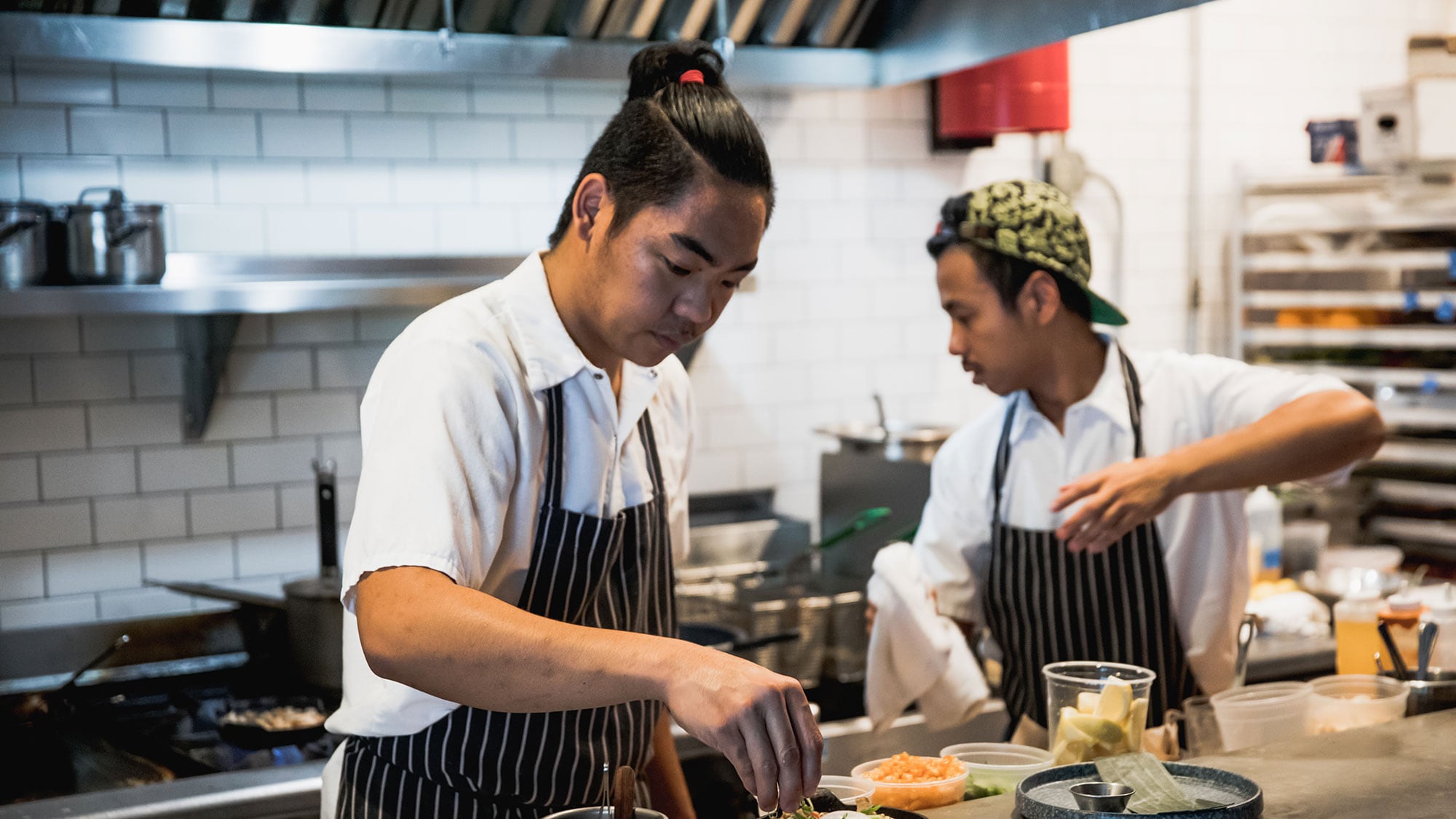For almost my entire life, I ate Filipino food only at home—or spooned it off hot-table buffets in strip malls or at food carts.
It's taken a lifetime, my lifetime, to see Filipino cuisine cooked with care, in an actual restaurant with table service. As someone whose friends constantly raved about my parents' food, I've always found this phenomenon puzzling. I've read food writers who say it's the Philippine palate, which favors sweet, stinky or sour flavors that are off-putting to Western tastes. Or maybe it's the food's confusing hodgepodge of cultural influences resulting from centuries of colonization. It's hard to think of Filipino food as Southeast Asian when it includes elements like Spanish adobo seasoning, or fried G.I. Spam. Having delicacies like balut, or fertilized duck embryo, show up on Fear Factor probably doesn't help.
But that's all starting to change. Filipino cuisine is finally having its moment: Maharlika in New York and Bad Saint in Washington, D.C., are garnering national acclaim, and cookbooks like last year's I Am a Filipino are flying off bookshelves. It's past time for a food city like Portland to have its own great Filipino restaurant. And with Carlo Lamagna's Magna, we've got one.

The former executive chef at Clyde Common, Lamagna also ran the Twisted Filipino pop-up dinner series for almost a decade, kindling Portland's desire for fresh, authentic Filipino food. Now, he's found a permanent home on Southeast Clinton Street, in a small, brightly lit space formerly occupied by Noho's Hawaiian Cafe.
To a first-gen Filipino who grew up eating this food at every meal, Lamagna's dishes are both intimately familiar and achingly cool. It's like meeting up with your best girlfriend in London and realizing she owns a flat in Crouch End and was in two episodes of Game of Thrones. She's still recognizably her, just the best version of her possible. And for the uninitiated, Magna is a first-class introduction to the tangy-sweet, salty-savory, East-West combination of counterpoints that make up Filipino cuisine.

Take the bistec (pronounced like "beefsteak"). In my kitchen, this is homey fare—a mangy end of chuck roast that's soaked in salt and acid, beaten with a heavy skillet, and fried into submission. But at Magna, it takes the form of tender slices of seared, citrus-marinated rib-eye, poised atop succulent bone marrow and garnished with grilled cilantro, crisp fried garlic, and a heat-kissed onion ($25). Or the classic sinigang ($17), a tamarind soup with a clear, tangy broth and abundant mussels and clams. It is as gorgeous and decadent as a bouillabaisse, and I spooned up everything eagerly with rice.
In Lamagna's hands, even the humble tortang talong ($11) gets transformed. This is a simple fried eggplant omelet normally eaten with rice for breakfast, often alongside obscene amounts of ketchup. At Magna, it's coddled with as much care as an Escoffier-style omelet, served with a spray of quick-pickled watermelon radishes, onions, and fresh tomatoes. The bright vinegar cuts the umami of the fried eggs, leading my dining companion to exclaim that this is one of the best ways to eat vegetables he's ever tried.

Magna has been open for only about five weeks, and it's still working out a few growing pains. Its liquor license hasn't been approved yet, so there's only water to drink. The décor, while welcoming, feels somewhat brusque, almost like a high school cafeteria. Cushions in the colors of the Filipino flag line a long bench-style seat along one wall, with specials written in colored chalk on an enormous chalkboard above it and hungry would-be patrons peering in enormous windows. The service was also a little spotty. At 7 pm on a Wednesday night, it took more than a half-hour for someone to take our order.
None of that seems to matter, though. On our visits, every table and seat was full. But the wait is worth it—especially if you live far away from your Filipino mother. Sure, there are showstopper specials, like a platter of crispy pata, or fried pork leg ($30-$50), that arrives, resplendent, on a platter lined with banana leaves and served on a bed of moist, flavorful garlic-fried rice. But the dishes that really get me are the lumpiang shanghai ($9)—fried egg rolls stuffed with pork and mushrooms—and pancit bihon ($13), the Filipino version of Chinese glass noodles tossed with fried chicken chicharron and julienned carrot, cabbage and scallions. They taste exactly what you'd get at my mom's house, with a touch more ginger in the pancit.
For now, I'm crossing my fingers that eventually the rush will die down and Magna will become a relaxed, cheerful cafe where I can take my kids to eat the food I grew up with. It doesn't look like it's going to slow down anytime soon, but I can hope.
EAT: Magna, 2525 SE Clinton St., 503-395-8542, magnapdx.com. 5-9 pm Tuesday-Saturday.
